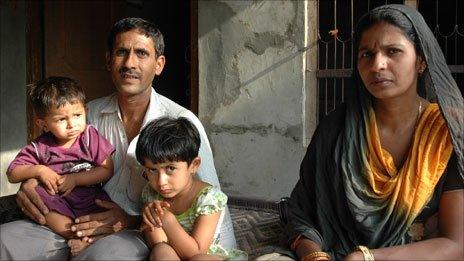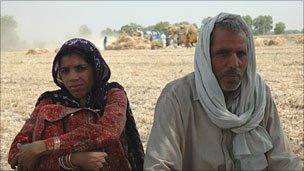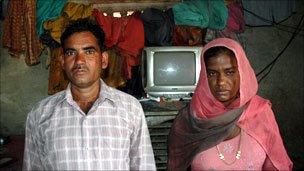India's 'imported' brides
- Published

Sreeja has struggled to come to terms with Haryana's patriarchal society
A shortage of women in Haryana has led some Indian men to seek wives from other states, but the "imported" brides often struggle to adapt, writes the BBC's Soutik Biswas.
On the face of it, Sreeja leads a contented life with her husband, two children and a pet dog in a cosy two-room brick and cement village home in this northern state.
But prod her a little, and she begins speaking openly about life in a society steeped in patriarchy.
"Men here don't allow their women to go out and work. They just dominate."
She sits in her tiny, unkempt garden in Sorkhi in Hissar district, drinking black tea and munching on banana chips and local sweets laid out on a plastic chair.
Her husband, Birbal Singh, who owns five acres of land and drives a small delivery van for a living, smokes a hookah and looks at her amusedly.
Sreeja continues, happy to have found a listener.
"So all you do is farm work and chores at home. There is this dreariness of work in the boiling heat. There is no relief. It hardly rains in these parts.
"That's not all. Safety is a concern. Women are not safe here - they are harassed and sometimes attacked. Where I come from, women can walk around safely.
"Hindu married women here wear veils. Why? Back home only Muslims women wear veils. Here, they abort and kill their girls. Then they complain about a lack of girls and bring them from other states to marry."
Illegal abortions
Sreeja travelled more than 2,000km (1,240 miles) from her parents' home in Kerala in southern India to set up home with her husband in Haryana. He had tired of waiting to find a local bride so he used connections to make contact with her family.

Ajit Singh waited for 12 years before marrying Omna from Kerala
Inter-state marriages are rare in rural India. Yawning differences in language, food, cultural habits, weather, attitudes to women and even names easily conspire to make such alliances unworkable.
But Birbal was unable to find a bride in Haryana, which has the most unbalanced sex ratio in the country, with 877 women for every 1,000 men. Among under sevens, that ratio drops to just 830 girls for every 1,000 boys.
Experts say Haryana's situation is the result of illegal sex-selective abortions, female infanticide, parental neglect and discrimination against girl children.
The good news is that both ratios are slightly higher than the rate in the 2001 census, thanks to moves against antenatal sex-determination clinics and a gender awareness drive.
The bad news is that the ratios are still way behind India's average - 914 girls for every 1,000 boys under seven, and that gap itself has widened since 2001.
In contrast, Kerala has a laudable 1,084 women for every 1,000 men, according to the 2011 census, considerably higher than the national average of 940 women for every 1,000 men.
Renamed wife
Birbal and Sreeja are not the only couple in Sorkhi from different Indian cultures.
Men in Haryana, unable to find a bride at home, are willing to pay up to 100,000 rupees ($2,222) to marry an "imported" girl from states like West Bengal, Jharkhand, Bihar or Madhya Pradesh.
With fewer women the "marriage market" has taken an interesting turn.
Usually, a bride's family pays a large dowry to the groom's family. But these days prospective grooms in areas short on women often need to have substantial amounts of land and a secure government job if they are to win a wife.
In Sorkhi, the "imported" brides have adapted to life in this alien land, giving up their jobs and learning the local Hindi dialect.

Rambir says his wife takes care of the finances
Ajit Singh, a Sorkhi-based farmer, says he spent 12 years looking for a bride without success before he married Omna, a 35-year-old woman from Kerala.
"The girls from Kerala eat rice, we eat flattened bread. They use coconut oil for cooking, we don't use that. They are non-vegetarian, we are vegetarian. I made all this very clear to her before we got married," says Ajit Singh.
Across the street, Rambir, a mechanic, has been married to Thangkamma, also from Kerala, for three years.
His first wife died 13 years ago, and he struggled to find a new bride - and when he did, he found he could not pronounce her name, so he promptly renamed her Radhika.
Of her marriage, Sreeja says: "We live in two worlds in our minds, but we manage. But when I go home to my parents, I don't feel like coming back."
- Published23 May 2011
- Published23 May 2011
- Published23 May 2011